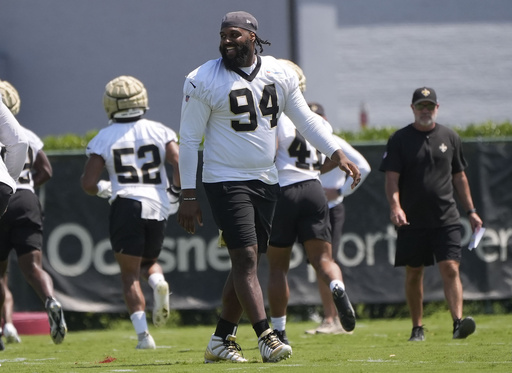
ASHBURN, Va. — During a recent practice, Washington Commanders wide receiver Terry McLaurin found himself reflecting on the racial dynamics within the NFL when addressed by a reporter. He shared a realization: “I’ve never been coached by a Black head coach at any level, be it high school, college, or the NFL. Only coordinators and position coaches have been Black.”
Like many of his fellow players, McLaurin expressed his concerns regarding the underrepresentation of Black head coaches in the league. A survey conducted with more than 65 Black players across 25 NFL teams revealed that around 36% were either disheartened or frustrated by the low number of Black coaches. “As long as we continue to see this lack of representation, we’re all going to regard the situation as inadequate,” stated Dolphins linebacker Anthony Walker Jr.
This year’s Super Bowl matchup features two Black starting quarterbacks from the Kansas City Chiefs and Philadelphia Eagles, yet neither coaching staff includes a Black head coach. Panthers safety Nick Scott drew a comparison to the longstanding biases surrounding Black quarterbacks and the challenge of changing perceptions within coaching ranks. “There has been a narrative regarding Black QBs, suggesting they lack mental acuity. I am not sure how change can be fostered here, though,” Scott noted, emphasizing his hope that hiring should be based on qualifications rather than any misguided sense of obligation.
Amidst changing federal policies regarding diversity and inclusion initiatives in various sectors, NFL Commissioner Roger Goodell affirmed that the league will persist in its commitment to diversity initiatives. The disparity between the proportion of Black players, 53.5% in 2023, and Black head coaches, which stands at a mere 22% at the beginning of the season, has raised eyebrows. A further drop to 19% is anticipated depending on the hiring decisions made by the New Orleans Saints regarding their vacant position.
McLaurin pointed out the need to address this discrepancy. “It’s important to ensure that the best candidate is selected for the job. But given the substantial number of African-American players in the NFL, an equal representation in coaching would certainly be desirable, too,” he said. Notably, looking at the landscape of NFL franchises, his team, the Commanders, is one of 11 teams that have never had a full-time Black head coach.
The data indicates historic trends do not favor diversity in the coaching ranks, as over a span of 25 seasons from 2000 to 2024, only 31 of the 173 new head coaches in the NFL, or roughly 18%, were Black. Cowboys special teams player C.J. Goodwin acknowledged the discouraging nature of statistics like these, emphasizing the capability of Black coaches in the league.
Interestingly, a majority, 58%, of surveyed players expressed shock when confronted with these statistics, illustrating an awareness of the issue but not necessarily a feeling of disillusionment. The current season commenced with seven Black head coaches but saw two of them, Antonio Pierce and Jerod Mayo, part ways with their teams in January. Only one of the six new hires this offseason is Black.
Jets defensive lineman Solomon Thomas reflected on the illogical nature of the surprise surrounding Black coaches, stating, “In a league represented predominantly by Black athletes, there’s definitely room for increased diversity among coaching staff.”
Brandon Brown of The Institute for Diversity and Ethics in Sport highlighted that players are justified in their feelings of concern. “There’s always a need for continued progress; witnessing setbacks can feel quite disheartening,” he noted. “From discussions within the NFL, there seems to be genuine effort directed towards diversity in coaching hires, but the outcome is still not clear.”
Reflecting on coaching diversity in other leagues, there’s a stark contrast to the NBA, where around 70% of players are Black, and 37% of teams are led by Black coaches. Meanwhile, in Major League Baseball, only three teams have Black managers, while the NHL has had just one Black head coach in its history.
A significant percentage of NFL players surveyed, nearly 40%, expressed aspirations of becoming head coaches someday, while some are likely to pursue coaching at various levels, including college or youth leagues. Over 90% found encouragement in the increase of Black coaches securing full-time roles last offseason, tying for the highest figures seen since 2000.
The NFL established the Rooney Rule in 2003 to bolster diversity among coaching and front-office positions by mandating interviews with minority candidates. However, McLaurin suggested that the effectiveness of the rule can sometimes be compromised. “While the Rooney Rule is commendable, some teams merely utilize it to fulfill requirements rather than genuinely pursuing diverse candidates,” he stated.
Various recent coaching searches raised suspicions regarding superficial compliance with the Rooney Rule, with critics suggesting some interviews were little more than formalities intended to placate public opinion. Goodell responded by affirming that the league emphasizes thorough and sincere interviews to better ensure genuine consideration for minority candidates.
Identifying the root causes for the disparity in head coaches, some players, like Ravens safety Kyle Hamilton, highlighted the influence of networking and nepotism within the league. “For Black professionals in this industry, the journey is challenging. Historically, the predominantly white head coach demographic has led to entrenched networks that exclude many qualified candidates,” Hamilton noted.
Ultimately, the dialog surrounding coach diversity in the NFL underscores broader societal issues, as articulated by Goodwin: “The question reflects larger societal dynamics rather than simply the workings of the NFL.”

